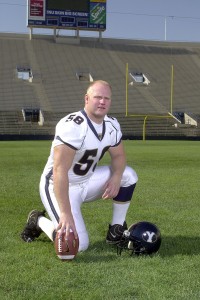The Church of Jesus Christ of Latter-day Saints teaches members it is important to “keep the Sabbath Day holy” and forgo certain activities; however, playing sports on the Sabbath is an individual decision many athletes are faced with in professional their careers.
Former Pittsburgh Steelers player Chris Hoke is just one LDS athlete to be faced with the decision to play on Sundays.
“It’s a very sensitive subject in the Church,” Hoke said. “People have very strong opinions about it. Some people are very, very passionate about playing about Sundays, and I see why.”

Hoke began his collegiate football career at BYU after serving a two-year mission in Belgium and France. Professional football was always on Hoke’s mind as he watched teammates and neighbors signing NFL contracts.
Eventually, it was his turn. During his junior and senior years as a Cougar, he began to hear mumblings.
“I knew it was a possibility and I would probably get a chance to play in the NFL,” Hoke said. “I wanted to seize that opportunity.”
Hoke played 11 years with the Steelers, becoming a two-time Super Bowl champion and playing nosetackle ahead of Casey Hampton. Hoke’s family and friends were often asked how he managed to balance church and work.
“I felt the decision was between me and the Lord, and that’s how I looked at it,” Hoke said. “It wasn’t between me and other members of the Church or anyone else but me and my wife and the Lord.”
Hoke’s feelings about athletics on Sundays are shared by many athletes, despite the decision they have made. Aleisha Rose, former BYU soccer player and member of the US National Women’s Professional team, also believes this decision is a very personal one.
“Keeping the Sabbath day holy is a personal decision,” Rose said. “Lots of people play professionally. That’s their job, that’s what they’re doing to provide for their families. I felt strongly about what’s important for me and my family, but at the same time, people are given direction and need to make that decision for themselves.”
Rose competed on Sundays growing up and during her professional career. During exhibition games in China, Rose realized she no longer wanted to compete on Sundays. She came to the conclusion that for her and her family, she should no longer continue to play with the US National Team.
“I wanted to be happy and said I’ll do whatever I need to do,” Rose said. “I wanted to feel peace from living the gospel. In an answer to my prayers, I realized part of it is keeping the Sabbath day holy and having that balance in my life. It was OK for me to take a different course.”
Sunday play appears to be a requirement in some sports, as opposed to other sports. BYU lacrosse player Grayson Dahl explained that lacrosse receives ample field time on the East Coast, taking priority over soccer and football. Dahl said because lacrosse was a school-sanctioned sport at his high school, he was not required to play on Sundays. Dahl’s conflict came at an early age, however, when tournament play was on Sundays.
Brittany Critchfield, a BYU track athlete, said she has never been required to compete on Sundays in track meets. Critchfield did compete on Sundays for basketball, however, when she played in high school.
Jake Petersen, a BYU soccer player from Roy, Utah, also ran into conflict with tournament play. Petersen played for the Real Salt Lake Development League, where many tournaments are played out of state and such play occurs on Sunday. Petersen explained he did compete on Sundays until his mission, when his perspective changed.
“It was ultimately my own choice to play or not,” Petersen said. “When I went on my mission, I saw a bunch of members who didn’t play on Sundays and sacrificed a lot not to play a sport they loved. I really changed because of it.”
Petersen said he now chooses to keep the Sabbath day holy by avoiding homework and focusing on the importance of this special day. BYU teams do not participate in athletics on Sundays, so athletes like Petersen are not forced to make this choice.
As these athletes emerge into higher levels of competition, athletics may change from a hobby into a career. Hoke felt an NFL career would be a wise choice for him and his family because of the missionary work that would come through professional sports.
“I knew the job, what the job entailed and (that it) would require me to play on Sundays,” Hoke said. “I looked at it as an opportunity to go out there and be a light to the Church as a professional athlete. With the notoriety you get, with the fame that comes with being a professional athlete, I felt like I could put a positive light on the Church.”




